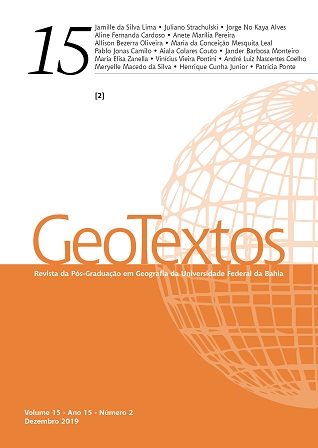IDENTITY AND PLACE IN THE METAPHENOMENOLOGY OF THE PAYAYÁ’S ALTERITY
DOI:
https://doi.org/10.9771/geo.v15i2.34171Keywords:
Yby, Ethics of alterity, Indigenous people, Coloniality, Emmanuel LévinasAbstract
The identity-place relationship presents an ambivalence that goes from celebration to condemnation, gaining a new impetus after the 1990s, both with the relevance that identity resistance movements (ethnic, racial and gender) have achieved, fighting for the place – as territory –, as with the strength that crying for respect differences and the oppressive and colonial sense of identity received, questioning the role of the territorialization processes in the conflicts and in the denial of the distinctions that promote the capture of the Other by the Same. We move the question of the identity-difference relationship to the nexus between consciousness-place, undoing this association that gives relevance to sense in the face of the non-sense. The prevalence of consciousness is understood as one of the instruments of the imperialist colonizing reason, Eurocentric, and therefore it is necessary to break it into another geographical sense of identity. But how do we give meaning to our geographical relationship and its implication to identity, freeing ourselves from the bonds of consciousness and the colonial models of the intellection of being? This is the main question that mobilized the paper, which will be faced from the experience with the Payayá natives and the interlocution with the philosophy of Emmanuel Lévinas, as methaphenomenology, toward a Latin American descolonial thinking.Downloads
Downloads
Published
How to Cite
Issue
Section
License
Autores que publicam nesta revista concordam com os seguintes termos:
Autores mantém os direitos autorais e concedem à revista o direito de primeira publicação, com o artigo simultaneamente licenciado sob a Licença Creative Commons Creative Commons CC BY que permite o compartilhamento do trabalho com reconhecimento da autoria e publicação inicial nesta revista. Esta licença permite que outros distribuam, remixem, adaptem e criem a partir do seu trabalho, mesmo para fins comerciais, desde que lhe atribuam o devido crédito pela criação original. É a licença mais flexível de todas as licenças disponíveis. É recomendada para maximizar a disseminação e uso dos materiais licenciados. Ver o resumo da licença em: https://creativecommons.org/licenses/by/4.0/ Ver o texto legal da licença em: https://creativecommons.org/licenses/by/4.0/ Consulte o site do Creative Commons: https://creativecommons.org/licenses/?lang=pt
Autores têm autorização para assumir contratos adicionais separadamente, para distribuição não-exclusiva da versão do trabalho publicada nesta revista (ex.: publicar em repositório institucional ou como capítulo de livro), com reconhecimento de autoria e publicação inicial nesta revista.
Autores têm permissão e são estimulados a publicar e distribuir seu trabalho online (ex.: em repositórios institucionais ou na sua página pessoal) a qualquer ponto antes ou durante o processo editorial, já que isso pode gerar alterações produtivas, bem como aumentar o impacto e a citação do trabalho publicado (Veja O Efeito do Acesso Livre).






